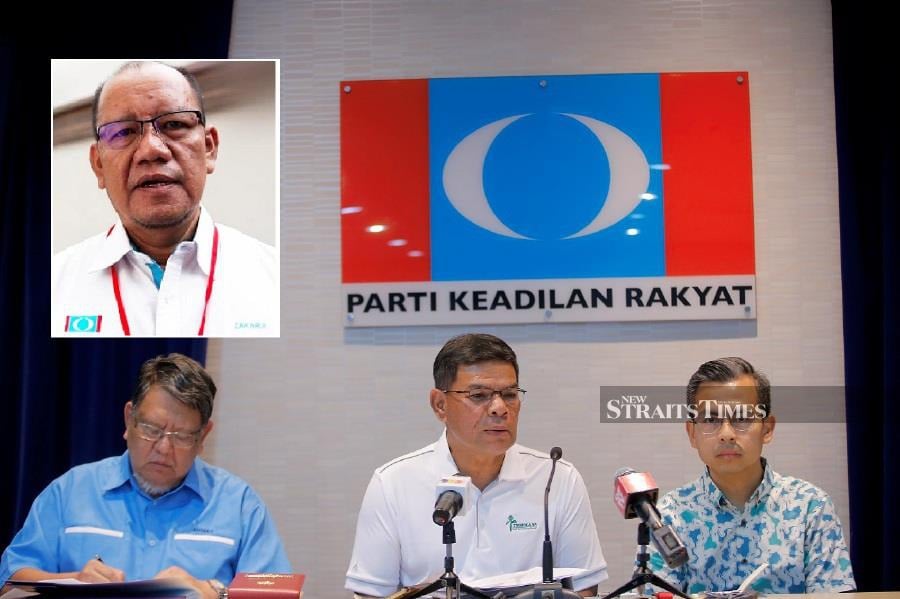THE chai, or wishlist, that was disseminated during PKR’s last party polls at the end of last year had created a stir among some groups in the party.
Most of the names were aligned with incumbent deputy president Datuk Seri Azmin Ali, much to the dismay of those from the rival camp led by then-incoming president Datuk Seri Anwar Ibrahim, who was just released from jail after being granted a royal pardon.
Anwar’s team did not even manage to produce a chai, which during party polls, is considered an underhanded attempt to influence the minds of voting delegates.
While it does not go against the party’s policies in general, it is a tradition which is largely frowned upon. But those aligned with Azmin were more than prepared to go for broke.
Among those on the chai were potential vice-presidents Tian Chua, Zuraida Kamaruddin and Datuk Dr A. Xavier Jayakumar. But more importantly, in the wake of recent developments, was the inclusion of Zakaria Abdul Hamid in the new PKR Central Leadership Council roster.
On the national scale, Zakaria is an unknown variable in PKR politics. Some considered him to be just another hard worker despite holding positions as the Bera PKR branch chief and member of the PKR Central Leadership Council; a grassroots leader as common as blades of grass.
But he appeared to be instrumental to Azmin’s camp, having been endorsed as a potential member of the council in the wishlist.
Apparently, he had done much to bolster support from PKR branches in the east coast. Azmin and Zuraida are more than indebted to Zakaria’s fortitude in rallying support for the chai.
For instance, sources claimed that before the party polls, holding nightly meetings even in the presence of “suspected spies” from Anwar’s camp did not deter Zakaria from carrying out his job.
“More often than not, the spies would either be turned or scuttle back to base with bad news of the latest political manoeuvres hatched by Azmin’s men,” another source claimed.
Hence, it is understandable that Zakaria’s sacking from the party is being protested by Zuraida and the like.
It is said that Zakaria’s removal — due to alleged corrupt practices — did not go through proper procedures and smacks of conspiracy.
But such allegations opposing the sacking have been met with sharp retort.
PKR communications director Fahmi Fadzil had said that Azmin’s camp should have attended party meetings for details.
Nevertheless, given Zakaria’s ties and significance to Azmin’s team, some observers have likened the move to a political “witch hunt” by Anwar’s team, made to send a message to rivals that they mean business.
Even with the Malaysian Anti-Corruption Commission’s (MACC) admission that it should not have sent a letter to the PKR leadership proposing disciplinary action against Zakaria, some claimed that Anwar’s team had premeditated the so-called witch hunt.
A source from the other side of the divide had expressed uneasiness over the latest development. The source said the allegations of a witch hunt would have been lessened considerably if Rafizi Ramli, a party vice-president known to be a staunch supporter of Anwar, also received disciplinary action for a host of unproven claims in the past.
“For instance, prior to the Sungai Besar by-election in 2016, Rafizi came out to say that he had lodged a report with MACC on allegations that money and women were demanded during project negotiations with the Selangor government.
“He was clearly working against Azmin, who was the Selangor menteri besar at that time. MACC, however, did not proceed with the case. We were told that MACC had said that the allegations were false. Why was no action taken against Rafizi over this?”
In retrospect, it could be argued that Azmin’s camp’s aggressive overtures during party polls to grasp power had more or less, culminated in retaliation from his boss.
The chai, clandestine meetings and the threat posed by overwhelming support from Youth members for Azmin had, according to his opponents, transformed the PKR No. 2 into a dangerous factor, which could destabilise the party leadership’s status quo.
Some argued that Azmin’s reactions towards attacks by Anwar’s cohorts were reminiscent of the latter’s fiery fervour upon being sacked from the government in 1998.
It begs the question of whether things have come full circle, and that Azmin had, in some way, failed to maintain his cool after years of lessons from observing Anwar’s political misfortunes.
The sacking of Zakaria is bound to further divide the party, which has been severely strained by Azmin’s supposed ambition to top his boss as the next prime minister and party president, as well as Anwar’s team’s unceasing reprisals.
It is reminiscent of MCA’s infamous Team A and Team B intense rivalry, which saw the late former deputy prime minister Tun Ghafar Baba presiding over party polls to mend torn fences in 1985.
If the same formula is to be employed, Deputy Prime Minister Datuk Seri Dr Wan Azizah Wan Ismail would not be a viable candidate to resolve the dispute due to her ties with Anwar, as his wife.
Tun Dr Mahathir Mohamad could not do it as well, due to Azmin’s perceived allegiance to the prime minister.
With no end to the political scuffle seemingly in sight, perhaps, the upcoming party congress will shed a light on solutions, or worse, an impending implosion.







